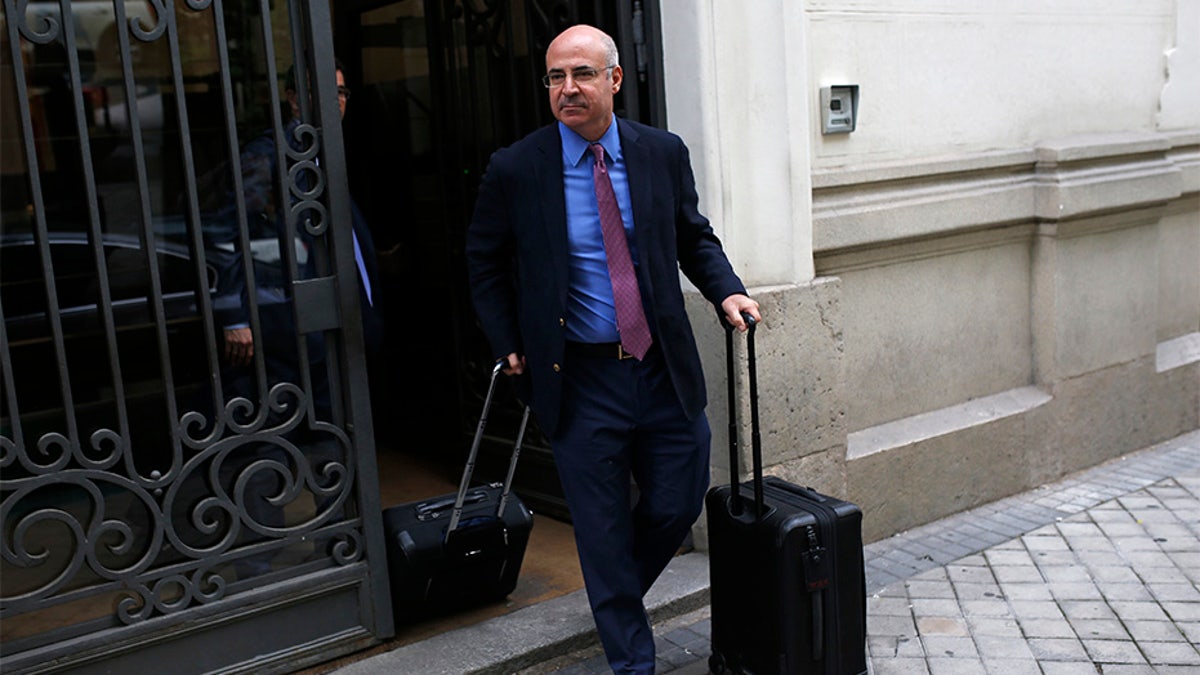
May 30, 2018: William Browder leaves the anti-graft prosecutor's office in Madrid. (AP)
A vocal critic of the Kremlin accused Putin and the Russian government Wednesday of trying to block his investigation into the murder of a former employee by taking advantage of an Interpol system of warrants, leading to his arrest and a brief detention in Spain.
U.S.-born and London-based investor William Browder said police took him away when he was heading to meet with prosecutors to share evidence on property investments in Spain with cash allegedly linked to murder of Sergei Magnitsky, a former employee who died in 2009 in jail after accusing Russian officials of involvement in a tax fraud scheme.
"Vladimir Putin and the Russian government are absolutely infuriated that we are bringing them to justice for the murder of Sergei Magnitsky,” Browder told the Associated Press.
Magnitsky's official cause of death was a heart attack, but independent investigators said he was tortured and denied medical treatment.
Browder, who is the head of the Hermitage Capital investment fund, has previously advocated for U.S. sanctions targeting Russian officials over human rights abuses and was the driving force behind the Magnitsky Act, named after Sergei.
Adopted in 2012, the Magnitsky Act permitted the U.S. to freeze financial assets of Russian officials who contributed to the abuse, arrest and death of Magnitsky. It was later expanded in 2016 to include human rights abusers anywhere.
A national police spokeswoman said Wednesday that Browder was released when agents confirmed that an arrest warrant from Russia that appeared in police databases was invalid. The spokeswoman had no authorization to be named in media reports.
For years, Moscow courts have been going after Browder.
In December, one court sentenced him to nine years in prison in absentia on charges of tax evasion and funneling money overseas. Browder and Ivan Cherkasov, an associate who was sentenced to eight years behind bars, were also ordered to pay $69 million to the Russian government in damages.
The same court convicted him of tax evasion in another trial in absentia in 2013 – all accusations which Browder denies.
"They are using everything they can to stop me, and the abuse of the Interpol system is another example of that," Browder told the Associated Press after meeting Spain's top anti-corruption prosecutor, Jose Grinda, following his release from detention.
Browder said he had shared with Grinda evidence about how $35 million allegedly connected to the 2009 murder of Magnitsky had been laundered through investments in Spanish property.
The financier, who is a plaintiff in the Spanish investigation, said Spain is among 15 countries following the money trail.
"We are hoping that eventually prosecutors here seize property, seize accounts and prosecute individuals so that nobody benefits from the murder of Sergei Magnitsky," Browder said.
The Magnitsky Act became a sore point between the U.S. and Russia after it was signed into law by former President Barack Obama in 2012. Shortly afterward, President Vladimir Putin signed a law banning American citizens from adopting Russian children, in a move widely viewed as retaliation.
Browder himself had reported his detention in Madrid in a series of tweets.
He posted a police document with the word "fraud" written as the cause for the detention, and then followed it with a photo of himself outside of a police station saying he had been released "after Interpol General Secretary in Lyon advised them not to honor the new Russian Interpol Red Notice."
He claimed that "this is the 6th time that Russia has abused Interpol in my case."
"Bill Browder remained in police custody this morning for the minimum necessary time, until Interpol Spain verified that the arrest warrant issued by the Russian authorities for tax evasion was invalid," according to a Spanish-language tweet by police.
However, in an email, Interpol said it has never issued a Red Notice for Browder. Red Notice alerts are sent to Interpol member countries to locate and arrest specific people based on a national warrant.
As early as July 2013, the international police organization said it erased from its database Russian requests to locate and arrest Browder due to its "predominantly political character."
Fair Trials, a global criminal justice watchdog, said the confusion over Browder's arrest highlighted the serious problems with Interpol's system of global "wanted person" alerts.
"Interpol should scrutinize alerts before it puts them out through its international networks," Fair Trials chief executive Jago Russell said in an email Wednesday. "Spain should also exercise sense and discretion before arresting people. The result could have been very different if it weren't for Browder's high profile."
British Foreign Secretary Boris Johnson welcomed Browder's release, tweeting: "Just spoken to Bill Browder - very glad that he has now been released."
"Moscow should concentrate on bringing those responsible for the murder of #Magnitsky to justice," Johnson added.
Browder led one of the biggest investment funds in Russia for 10 years before he left the country and was barred re-entry in 2006 on the grounds that he posed a threat to national security.
Fox News' Kaitlyn Schallhorn and the Associated Press contributed to this report.
